
XENOTRANSPLANTATION
Scope & Guideline
Connecting Researchers to Shape Tomorrow's Medicine
Introduction
Aims and Scopes
- Genetic Engineering in Xenotransplantation:
The journal emphasizes research on genetically modified pigs, particularly those expressing human genes, to reduce immunogenicity and improve graft acceptance in xenotransplantation. - Immunological Responses and Management:
A core area of research includes studying the immune responses to xenografts, including antibody-mediated rejection and strategies for immunosuppression. - Clinical Applications and Trials:
The journal publishes findings from clinical trials and studies involving pig organ transplantation into non-human primates and humans, focusing on the outcomes, challenges, and advancements in the field. - Ethical and Social Considerations:
Research addressing the ethical implications, public perception, and acceptance of xenotransplantation, including the attitudes of healthcare professionals and patients. - Disease Models and Preclinical Studies:
Utilizing various animal models to study the efficacy and safety of xenotransplantation methods, including the assessment of long-term graft survival and potential complications. - Pathogen Safety and Monitoring:
The journal covers advancements in monitoring and mitigating the risks associated with zoonotic infections and the presence of porcine viruses in xenotransplantation.
Trending and Emerging
- Gene Editing Technologies:
There is an increasing emphasis on the application of CRISPR and other gene-editing technologies to create pigs with desirable traits that enhance xenotransplantation success, such as reduced immunogenicity. - Novel Immunosuppressive Regimens:
Research has shifted towards developing and testing new immunosuppressive protocols tailored for xenotransplantation, focusing on minimizing rejection while reducing side effects for recipients. - Patient-Centric Studies:
Emerging themes include investigations into patient attitudes and knowledge regarding xenotransplantation, highlighting the importance of informed consent and patient acceptance in clinical settings. - Ethical Frameworks and Guidelines:
There is a growing trend towards establishing comprehensive ethical guidelines and frameworks to address the complexities of xenotransplantation, reflecting a heightened awareness of societal implications. - Long-Term Outcomes and Follow-Up Studies:
Recent publications have increasingly focused on long-term outcomes of xenotransplantation, including quality of life assessments and the durability of graft function, indicating a shift towards sustainable practices. - Microbiome and Host Interactions:
Research exploring the microbiome's role in xenotransplantation outcomes is emerging, reflecting a broader understanding of how host-microbe interactions influence graft acceptance and function.
Declining or Waning
- Historical Perspectives and Retrospectives:
Although historical accounts and retrospectives have provided valuable insights into the evolution of xenotransplantation, their presence has decreased as the field focuses more on current and future applications. - Basic Immunology without Clinical Context:
Research strictly focused on basic immunological principles without direct relevance to clinical applications or translational outcomes appears less frequently, as the emphasis shifts towards practical solutions and clinical trials. - Non-Transgenic Models:
There has been a noticeable decline in studies utilizing non-transgenic animal models for xenotransplantation as the field increasingly prioritizes genetically modified organisms that offer better compatibility and outcomes. - Single Organ Transplantation Studies:
Research concentrating solely on single organ transplantation without considering multi-organ approaches or combination therapies has diminished, reflecting a growing understanding of the complexities involved in xenotransplantation.
Similar Journals
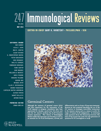
IMMUNOLOGICAL REVIEWS
Exploring the Frontiers of Immunology and Allergy Research.IMMUNOLOGICAL REVIEWS is a prestigious journal published by Wiley, renowned for its comprehensive and insightful contributions to the field of immunology. Established in 1969, this journal has become an essential resource for researchers, practitioners, and students interested in the latest advancements in immunological science, specifically focusing on both clinical and basic immunology as well as allergy studies. With an impressive Q1 ranking in both Immunology and Immunology and Allergy categories, and a prominent placement in the Scopus ranks (23/233 and 26/236 in their respective fields), this journal consistently showcases high-quality, peer-reviewed articles that significantly impact our understanding of immune responses. Although Open Access options are not available, the journal remains highly valuable, providing in-depth reviews and perspectives that foster further research and dialogue in immunological sciences. With a commitment to excellence, IMMUNOLOGICAL REVIEWS serves as a vital platform for disseminating knowledge, fostering scientific collaboration, and advancing the field toward innovative healthcare solutions.

HLA
Shaping the Future of Allergy Research Through CollaborationHLA, published by WILEY, is a distinguished academic journal that serves as a vital resource in the fields of Immunology, Genetics, and Allergy. With an ISSN of 2059-2302 and an E-ISSN of 2059-2310, HLA aims to provide cutting-edge research and developments that expand our understanding of human immunology, particularly concerning histocompatibility and antigen systems. Although it currently holds a Q4 quartile ranking in several categories—including Genetics and Immunology—it offers a platform for innovative studies that can catalyze new insights within the scientific community. The journal operates on an Open Access model, ensuring broader accessibility and engagement with emerging discoveries. Researchers, healthcare professionals, and students alike are encouraged to contribute to and utilize this journal to foster advancements in this rapidly evolving field. For submissions and more information, authors can navigate directly to its online portal, embracing the ongoing discourse in immunological research.
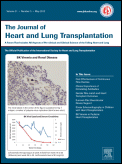
JOURNAL OF HEART AND LUNG TRANSPLANTATION
Advancing the Frontiers of Heart and Lung ScienceJOURNAL OF HEART AND LUNG TRANSPLANTATION, published by Elsevier Science Inc., serves as a premier platform for researchers and clinicians in the fields of Cardiology, Cardiovascular Medicine, Pulmonary and Respiratory Medicine, Surgery, and Transplantation. Since its inception in 1991, this esteemed journal has maintained a robust impact within the scientific community, currently holding a remarkable Q1 ranking in multiple categories as of 2023, indicative of its influential contributions to the field. With Scopus rankings placing it among the top ten in Surgery and fourth in Transplantation, it is essential reading for those looking to stay at the forefront of innovative transplantation techniques and cardiovascular research. Although not an open access journal, its rich content is crucial for advancing knowledge and promoting best practices, making it indispensable for professionals, students, and researchers dedicated to the life-saving field of heart and lung transplantation. The journal continues to foster academic excellence and facilitate impactful research, addressing contemporary challenges and innovations within these critical areas.
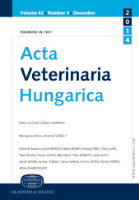
ACTA VETERINARIA HUNGARICA
Advancing veterinary science, one study at a time.ACTA VETERINARIA HUNGARICA is a prestigious academic journal published by AKADEMIAI KIADO ZRT, dedicated to the diverse field of veterinary science. With a history spanning over three decades since its inception in 1983, this journal provides a platform for the dissemination of high-quality research, clinical studies, and reviews that contribute to advancing knowledge in veterinary medicine and animal health. Based in Hungary, it has built a respectable reputation, reflected in its Scopus ranking, where it occupies the 84th position out of 194 in the General Veterinary category, placing it within the 56th percentile. Although the journal is not open access, it continues to attract a global audience of researchers, professionals, and students who are keen on exploring advancements in veterinary science as it converges towards its upcoming year of 2024. Readers will find valuable insights that foster innovation and improve animal care practices across various settings, making ACTA VETERINARIA HUNGARICA an essential resource for anyone involved in the veterinary field.

CELL AND TISSUE BANKING
Pioneering research in cell biology and tissue sustainability.CELL AND TISSUE BANKING, published by Springer, is a prominent journal dedicated to advancing the fields of biomaterials, biomedical engineering, cell biology, and transplantation. With its ISSN 1389-9333 and E-ISSN 1573-6814, the journal plays a crucial role in disseminating high-quality research from its inception in 2000 to its ongoing contributions through 2024. Situated in the Netherlands, it boasts a respectable 2023 impact factor with notable quartile rankings, positioning it within the Q3 category for biomaterials, biomedical engineering, and transplantation, and Q4 for cell biology. Furthermore, its Scopus rankings underscore its relevance and influence, particularly in the fields of medicine and engineering. Although it does not currently offer open access options, the journal remains a vital resource for researchers, professionals, and students alike, fostering innovation and knowledge transfer in the critical areas of cell and tissue sustainability.
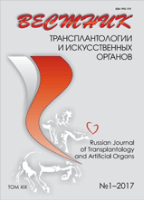
Vestnik Transplantologii i Iskusstvennyh Organov
Bridging knowledge and innovation in organ transplantation.Vestnik Transplantologii i Iskusstvennyh Organov, published by the Federal Research Center Transplantology & Artificial Organs V I Shumakov, is an esteemed open access journal that has been disseminating critical research in the fields of transplantation and immunology since 2009. With an ISSN of 1995-1191 and E-ISSN 2412-6160, this journal serves as a vital resource for academics and practitioners alike, offering insights into current trends, innovations, and methodologies in organ transplantation. The journal is indexed in prominent databases, holding a Q4 category in Immunology and Allergy and a Q3 in Transplantation as of 2023, ranking 42nd out of 54 in the field of Medicine - Transplantation, and 208th out of 233 in Medicine - Immunology and Allergy. Through its commitment to open access publishing and its strategic focus on advancing the science of transplantology, Vestnik Transplantologii i Iskusstvennyh Organov contributes significantly to the global body of knowledge, promoting collaboration and engagement among researchers, healthcare professionals, and students from around the world.
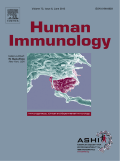
HUMAN IMMUNOLOGY
Championing Research in Allergy and ImmunologyHUMAN IMMUNOLOGY, published by Elsevier Science Inc, serves as a critical platform for disseminating research in the fields of immunology and allergy, as well as various aspects of miscellaneous medicine since its inception in 1980. With an ISSN of 0198-8859 and E-ISSN 1879-1166, this journal is pivotal for researchers and practitioners looking to advance their understanding of human immune responses and related conditions. The journal currently holds a respectable position within its field, as highlighted by its 2023 Scopus ranks—#114/233 in Immunology and Allergy and #132/236 in Immunology and Microbiology. Moreover, it maintains a Q2 quartile ranking in both Immunology and Allergy and miscellaneous Medicine, underscoring its influence and reach within the scientific community. Although it does not currently offer Open Access options, HUMAN IMMUNOLOGY remains dedicated to providing valuable insights and fostering academic discourse within its discipline, characterized by a rigorous peer-review process and a focus on innovative research trajectories.
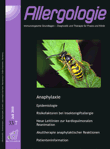
ALLERGOLOGIE
Exploring the Frontiers of Allergy and ImmunologyALLERGOLOGIE is a prominent academic journal dedicated to the field of immunology and allergy, published by DUSTRI-VERLAG DR KARL FEISTLE in Germany. Since its inception in 1978, the journal has provided a vital platform for researchers, clinicians, and students to disseminate their findings, share insights, and foster advancements in the understanding of allergic diseases and immunological responses. With an ISSN of 0344-5062 and an E-ISSN of the same number, it is a respected source within its category, currently ranked in the 2023 Q4 of the Scopus metrics in immunology and allergy, reflecting its commitment to quality and scholarly rigor. Although not fully open access, ALLERGOLOGIE makes significant contributions to the dialogue on allergy-related topics, encouraging engagement from its readership through a diverse array of articles that span from clinical trials to innovative research methods. This journal continues to be an essential resource for anyone involved in the pursuit of knowledge in allergy and immunology.
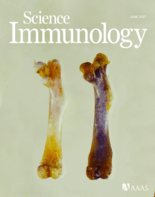
Science Immunology
Exploring the Depths of Immune ResponsesScience Immunology, published by the American Association for the Advancement of Science, is a leading journal in the field of immunology, recognized for its significant impact and rigor in advancing our understanding of immune responses and complex diseases. With an impressive impact factor that places it in the Q1 category of both immunology and allergy, as well as miscellaneous medicine, this journal is ranked #7 and #8 in their respective Scopus categories, reflecting its high-quality research output. Since its inception in 2016, Science Immunology has been at the forefront of interdisciplinary immunological research, fostering crucial insights that link immunology with pressing health challenges. The journal is committed to providing open access to its content, ensuring that groundbreaking findings are accessible to a global audience of researchers, professionals, and students. Its anthology not only addresses fundamental immunological mechanisms but also enhances the dialogue on translational applications and therapeutic interventions, solidifying its position as an essential resource within the scientific community.

Transplantation and Cellular Therapy
Illuminating Pathways in Immunology and Transplantation.Transplantation and Cellular Therapy is a leading journal published by Elsevier Science Inc, dedicated to advancing the fields of transplantation, immunology, cell biology, and molecular medicine. With its ISSN of 2666-6375 and E-ISSN 2666-6367, this journal serves as a vital resource for researchers, practitioners, and students aiming to stay at the forefront of innovative therapies and clinical practices in transplantation. As of 2023, it holds an impressive Q1 ranking in multiple categories, including Cell Biology, Hematology, Immunology and Allergy, Molecular Medicine, and Transplantation, reflecting its high impact and relevance in the scientific community. The journal, operating from its base in the Netherlands, supports Open Access publishing to enhance the dissemination and accessibility of groundbreaking research. Acknowledging the significance of transplantation and cellular therapies in modern medicine, Transplantation and Cellular Therapy is poised to propel future discoveries and developments in these critical domains.